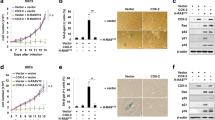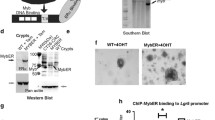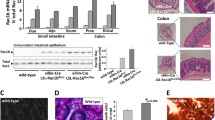Abstract
Cyclooxygenase-2 (COX-2) expression appears to be important in colorectal carcinogenesis. Elevated COX-2 expression and activity have been observed in several different transformed cell types. Prior studies implicating involvement of the Ras oncogene and growth factors on COX-2 expression were largely derived from rat small intestinal cell lines. We have investigated whether mouse colonocyte COX-2 levels are regulated by oncogenic Ras or transforming growth factor-β1 (TGF-β1), and whether these factors also serve to regulate cellular invasiveness. Young adult mouse colonocyte cells are colonocytes derived from the "Immortomouse" and immortalized by the SV40 large T antigen. Young adult mouse colonocyte Ras cells were derived by transfection of young adult mouse colonocyte cells with oncogenic Ha-Ras and are known to be tumorigenic. We found that the induction of COX-2 and eicosanoid release were augmented in the presence of activated Ras and that TGF-β1 caused a further increase in COX-2 in the Ras-transformed mouse colonocytes. Increased COX-2 expression was correlated with increased release of prostaglandins E2 and I2. Activated Ras and TGF-β increased the invasiveness of the young adult mouse colonocyte cells, but treatment with a COX-2 inhibitor did not inhibit invasiveness. Thus we found that transforming growth factor-β collaborates to increase COX-2 expression, protaglandin release, and invasiveness in mouse colonocytes, but the increased COX-2 activity does not appear to contribute to the invasive response.
Similar content being viewed by others
References
Beauchamp RD, Peeler MO, DuBois RN. Recent advances in the management of colorectal polyps. Curr Opin Gastroenterol 1996;12:12–17.
Tsujii M, Kawano S, Tsuji S, Sawaoka H, Hori M, DuBois RN. Cyclooxygenase regulates angiogenesis induced by colon cancer cells. Cell 1998;93:705–716.
DuBois RN, Shao J, Tsujii M, Sheng H, Beauchamp RD. GI delay in cells overexpressing prostaglandin endoperoxide synthase-2. Cancer Res 1996;56:733–737.
Kudo T, Narisawa T, Abo S. Antitumor activity of indomethacin on methylazoxymethanol-induced large bowel tumors in rats. Gann 1980;71:260–264.
Pollard M, Luckert PH. Effect of indomethacin on intestinal tumors induced in rats by the acetate derivative of dimethylnitrosamine. Science 1981;214:558–559.
Thun MJ, Namboodiri NM, Health CW Jr. Aspirin use and reduced risk of fatal colon cancer. N Engl J Med 1991; 325:1593–1596.
Giovannucci E, Egan KM, Hunter DG, Stampfer MJ, Cold-itz GA, Willet WC, Speizer FE. Aspirin and the risk of colorectal cancer in women. N Engl J Med 1995;333:609–614.
Smalley W, Ray WA, Daugherty J, Griffin MR. Use of nonsteroidal anti-inflammatory drugs and incidence of colorectal cancer: A population-based study. Arch Intern Med 1999;159:161–166.
Labayle D, Fischer D, Viehl P, Drouhin F, Pariente A, Bo-ries C, Duhamel O, Trousset M, Attali P. Sulindac causes regression of rectal polyps in familial adenomatous polyposis. Gastroenterology 1991;101:635–639.
Giardiello FM, Hamilton SR, Krush AJ, Piantadosi S, Hylind LM, Celano P, Booker SV, Robinson CR, Offer-haus GJ. Treatment of colonic and rectal adenomas with sulindac in familial adenomatous polyposis. N Engl J Med 1993;328:1313–1316.
Nugent KP, Farmer KC, Spigelman AD, Williams CB, Phillips RK. Randomized controlled trial of the effect of sulindac on duodenal and rectal polyposis and cell proliferation in patients with familial adenomatous polyposis. Br J Surg 1993;80:1618–1619.
Oshima M, Dinchuk JE, Kargman SL, Oshima H, Hancock B, Kwong E, Trzaskos JM, Evans JF, Taketo MM. Suppression of intestinal polyposis in Apc delta716 knockout mice by inhibition of cyclooxygenase-2 (COX-2). Cell 1996;87:803–809.
Sheng H, Shao J, Kirkland SC, Isakson P, Coffey RJ, Mor-row J, Beauchamp RD, DuBois RN. Inhibition of human colon cancer cell growth by selective inhibition of cyclooxygenase-2. J Clin Invest 1997;99:2254–2259.
Sheng H, Shao J, Dixon DA, Williams CS, Prescott SM, DuBois RN, Beauchamp RN. Transforming growth factorbeta 1 enhances Ha-Ras-induced expression of cyclooxygenase-2 in intestinal epithelial cells via stabilization of mRNA. J Biol Chem 2000;275:6628–6635.
Matsura H, Sakaue M, Subbaramaiah K, Kamitani H, Eling TE, Dannenberg AJ, Tanabe T, Inoue H, Arata J, Jettem AM. Regulation of cyclooxygenase-2 by interferon gamma and transforming growth factor alpha in normal human at ] keratinocytes and squamous carcinoma cells. Role of mitogen-activated protein kinases. J Biol Chem 1999;274:29138–29148.
Jones MK, Sasaki E, Halter F, Pai R, Nakamura T, Arakawa T, Kuroki T, Tamawski AS. HGF triggers activation of COX-2 gene in rat gastric epithelial cells: Action mediated through the ERK2 signaling pathway. FASEB 1999; 13:2186–2194.
Xie W, Herschman HR. Transcriptional regulation of prostaglandin synthase 2 gene expression by platelet-derived growth factor and serum. J Biol Chem 1996;271:31742–31748.
Xie W, Herschman HR. v-src induces prostaglandin synthase 2 gene expression by activation of the c-Jun-N-terminal kinase and the c-Jun transcription factor. J Biol Chem 1995;270:27622–27628.
Perkins DJ, Kniss DA. Rapid and transient induction of cyclo-oxygenase 2 by epidermal growth factor in human amnion-derived WISH cells. BiochemJ 1997;321:677–681.
Sheng H, Williams CS, Shao J, Liang P, DuBois RN, Beau-champ RD. Induction of cyclooxygenase-2 by activated Haras oncogene in Rat-1 fibroblasts and the role of mitogen-activated protein kinase pathway. J Biol Chem 1998;273:22120–22127.
Subbaramiah K, Chung WJ, Dannenberg AJ. Ceramide regulates the transcription of cyclooxygenase-2. Evidence for involvement of extracellular signal-regulated kinase/c-Jun N-terminal kinase and p38 mitogen-activated protein kinase pathways. J Biol Chem 1998;273:32943–32949.
Massague J. TGF-β signal transduction. Annu Rev Biochem 1998;67:753–791.
Engel ME, Datta PK, Moses HL. RhoB is stabilized by transforming growth factor β and antagonizes transcriptional activation. J Biol Chem 1998;273:9921–9926.
Hata A, Shi Y, Massague J. TGF-β signaling and cancer: Structural and functional consequences of mutations in Smads. Mol Med Today 1998;4:257–262.
Friedman E, Gold LI, Klimstra D, Zeng ZS, Winawer S, Cohen A. High levels of transforming growth factor beta 1 correlate with disease progression in human colon cancer. Cancer Epidemiol Biomarkers Prev 1995;4:549–554.
Beauchamp RD, Lyons RM, Yang EY, Coffey RJ Jr, Moses HL. Expression of and response to growth regulatory peptides by two human pancreatic carcinoma cell lines. Pancreas 1990;5:369–380.
Arteaga CL, Carty-Dugger T, Moses HL, Hurd SD, Pieten-pol JA. Transforming growth factor beta 1 can induce estrogen-independent tumorigenicity of human breast cancer cells in athymic mice. Cell Growth Differ 1993;4:193–201.
Sun L, Wu G, Willson JK, Zborowska E, Yang J, Raj-karunanayake I, Wang J, Gentry LE, Wang WF, Brattain MG. Expression of transforming growth factor beta type II receptor leads to reduced malignancy in human breast cancer MCF-7 cells. J Biol Chem 1994;269:26449–26455.
Hoosein NM, McKnight MK, Levine AE, Mulder KM, Childress KE, Brattain DE, Brattain MG. Differential sensitivity of subclasses of human colon carcinoma cell lines to the growth inhibitory effects of transforming growth factor-beta 1. Exp Cell Res 1989;181:442–453.
Forrester K, Almoguera C, Han K, Grizzle WE, Perucho M. Detection of high incidence of K-ras oncogenes during human colon tumorigenesis. Nature 1987;327:298–303.
Bos JL, Fearon ER, Hamilton SR, Verlaan-de Vries M, van Boom JH, van der Eb AJ, Vogelstein B. Prevalence of ras gene mutations in human colorectal cancers. Nature 1987; 327:293–297.
Filmus J, Zhao J, Buick RN. Overexpression of H-ras oncogene induces resistance to the growth-inhibitory action of transforming growth factor beta-1 (TGF-β 1) and alters the number and type of TGF-beta-1 receptors in rat intestinal epithelial cell clones. Oncogene 1992;7:521–526.
Winesett MP, Ramsey GW, Barnard JA. Type H TGF (beta) receptor expression in intestinal cell lines and in the intestinal tract. Carcinogenesis 1996;17:989–995.
Whitehead RH, Van Eeden PE, Noble MD, Ataliotis R, Jat PS. Establishment of conditionally immortalized cell lines from both colon and small intestine of adult H-2Kb-tsA58 transgenic mice. Proc Natl Acad Sci USA 1993;90:587–591.
Saha D, Datta PK, Sheng H, Morrow JD, Wada M, Moses HI, Beauchamp RD. Synergistic induction of cyclooxygenase-2 by transforming growth factor-beta 1 and epidermal growth factor inhibits apoptosis in epithelial cells. Neoplasia 1999;1:508–517.
Gilbert RS, Reddy ST, Kujubu DA, Xie W, Luner S, Her-schman HR. Transforming growth factor beta 1 augments mitogen-induced prostaglandin synthesis and expression of the TIS10/prostaglandin synthase 2 gene both in Swiss 3T3 cells and in murine embryo fibroblasts. J Cell Physiol 1994;159:67–75.
Gilbert RS, Reddy ST, Targan S, Herschamn HR. TGF-beta 1 augments expression of the TIS10/prostaglandin synthase-2 gene in intestinal epithelial cells. Cell Mol Biol Res 1994;40:653–660.
Sheng H, Shao J, Hooton EB, Tsujii M, DuBois RN, Beau-champ RD. Cyclooxygenase-2 induction and transforming growth factor beta growth inhibition in rat intestinal epithelial cells. Cell Growth Differ 1997;8:463–470.
Sheng H, Shao J, O’Mahony CA, Lamps L, Albo D, Isakson PC, Berger DH, DuBois RN, Beauchamp RD. Transformation of intestinal epithelial cells by chronic TGF-β1 treatment results in downregulation of the type II TGF-β receptor and induction of cyclooxygenase-2. Oncogene 1999; 18:855–867.
Tsujii M, Dubois RN. Alterations in cellular adhesion and apoptosis in epithelial cells overexpressing prostaglandin endoperoxide synthase 2. Cell 1995;83:493–501.
Tsujii M, Kawano S, DuBois RN. Cyclooxygenase-2 expression in human colon cancer cells increases metastatic potential. Proc Natl Acad Sci USA 1997;94:3336–3340.
Heasley LE, Thaler S, Nick M, Price B, Skorecki K, Ne-menoff RA. Induction of cytosolic phospholipase A2 by oncogenic Ras in human non-small cell lung cancer. J Biol Chem 1997;272:14501–14504.
Caulin C, Scholl FG, Frontelo P, Gamallo C, Quintanilla M. Chronic exposure of cultured transformed mouse epidermal cells to transforming growth factor-beta 1 induces an epithelial-mesenchymal transdifferentiation and a spindle tumoral phenotype. Cell Growth Differ 1995;6:1027–1035.
Zambruno G, Marchiso PC, Marconi A, Vascieri C, Mel-chiori A, Giannetti A, De Luca M. Transforming growth factor-beta 1 modulates beta 1 and beta 5 integrin receptors and induces the de novo expression of the alpha v beta 6 heterodimer in normal human keratinocytes: Implications for wound healing. J Cell Biol 1995;129:853–865.
Oft M, Peli J, Rudaz C, Schwarz H, Beug H, Reichmann E. TGF-beta 1 and Ha-Ras collaborate in modulating the phenotypic plasticity and invasiveness of epithelial tumor cells. Genes Dev 1996;10:2462–2477.
Oft M, Heider KH, Beug H. TGF-beta signaling is necessary for carcinoma cell invasiveness and metastasis. Curr Biol 1998;8:1243–1252.
Author information
Authors and Affiliations
Corresponding author
Additional information
Supported by National Institutes of Health grants CA69457, CA77839, and DK52334 (R.D.B.), and by an American College of Surgeons Resident Research Scholarship (C.D.R.).
Rights and permissions
About this article
Cite this article
Roman, C.D., Morrow, J., Whitehead, R. et al. Induction of cyclooxygenase-2 and invasiveness by transforming growth factor-β1 in immortalized mouse colonocytes expressing oncogenic ras. J Gastrointest Surg 6, 304–309 (2002). https://doi.org/10.1016/S1091-255X(01)00041-5
Issue Date:
DOI: https://doi.org/10.1016/S1091-255X(01)00041-5




